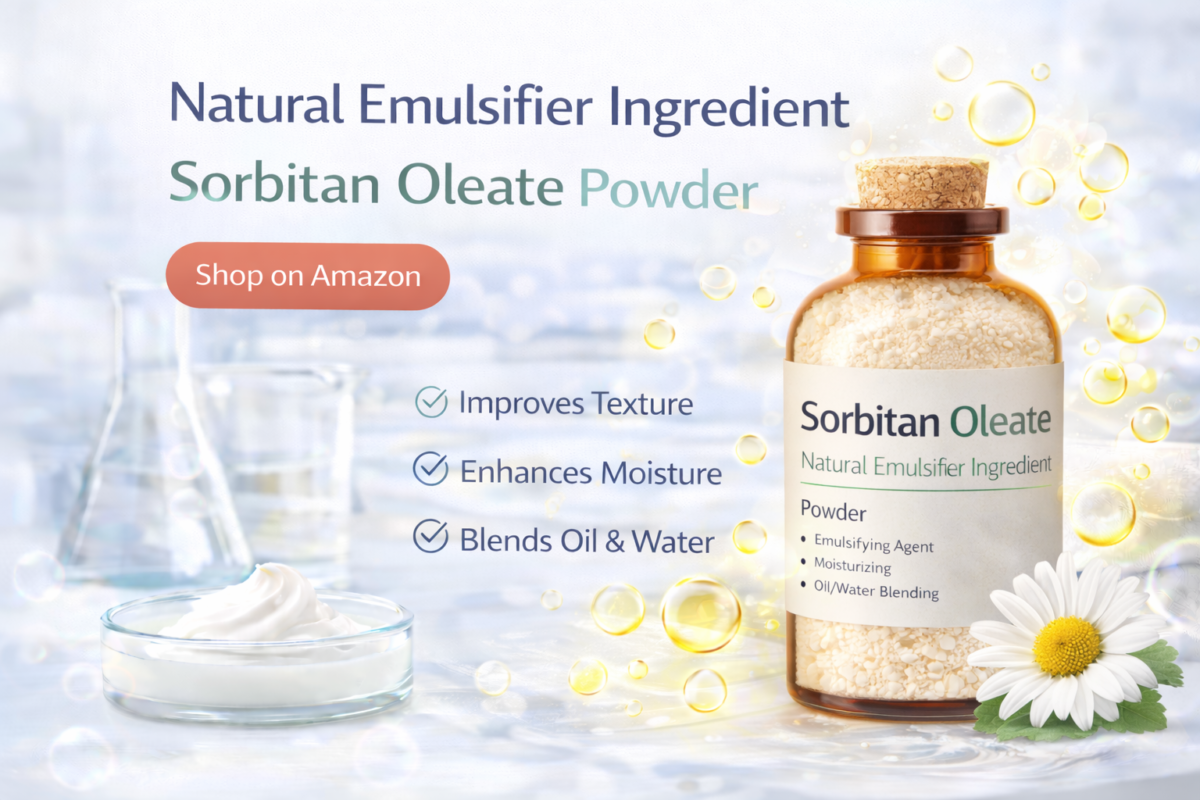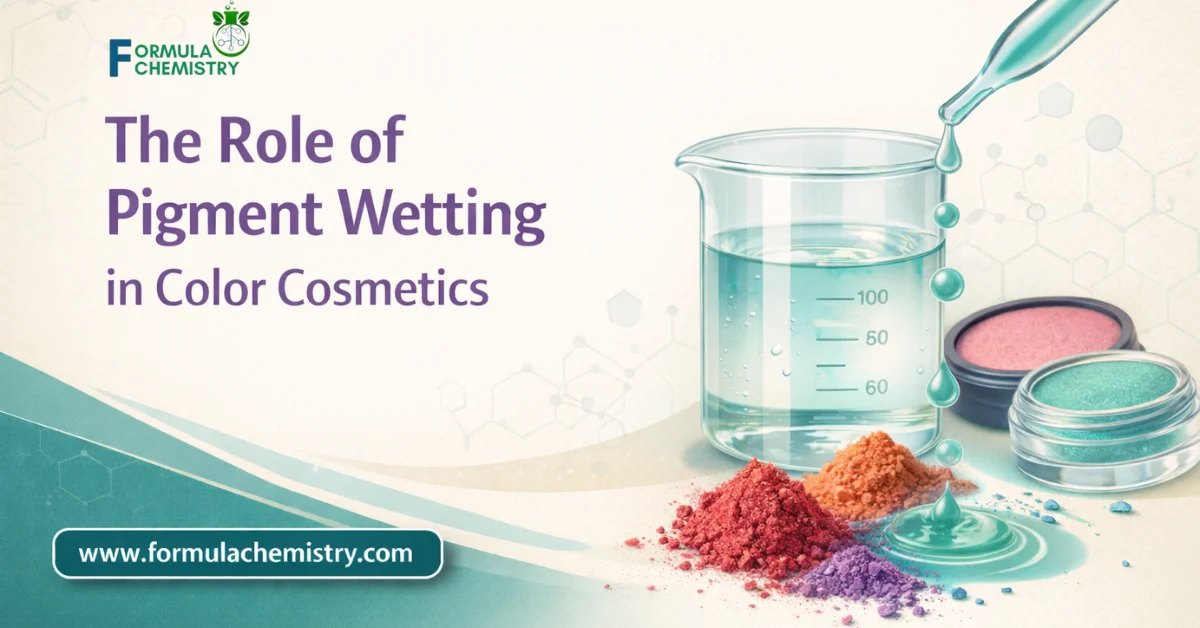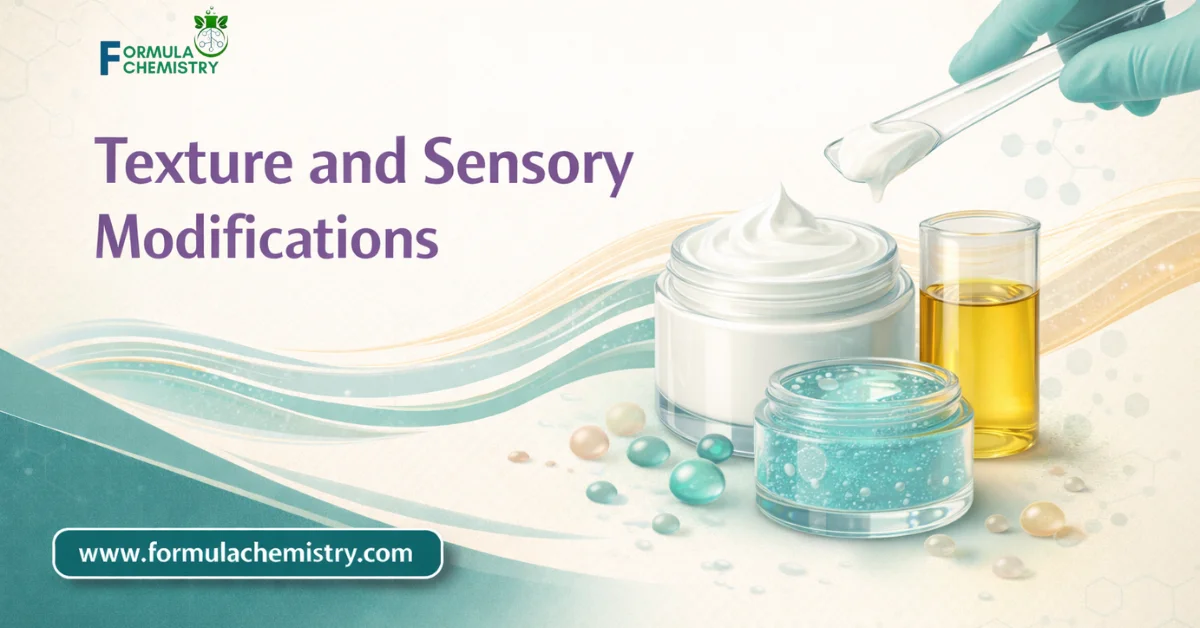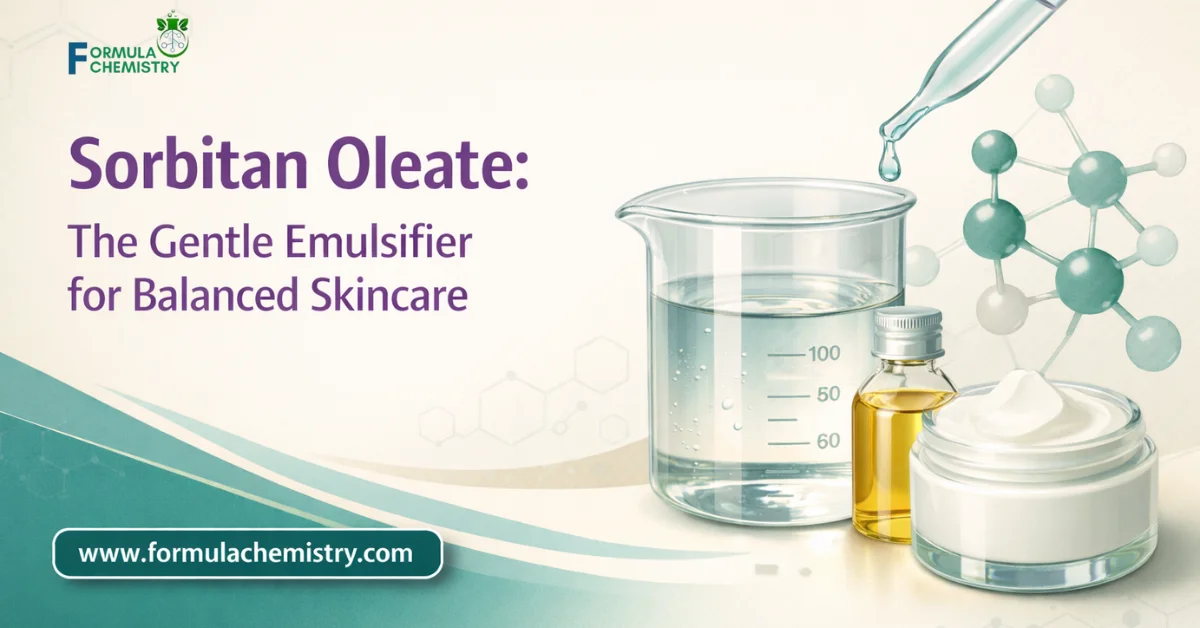Introduction
Sorbitan Oleate is a mono-ester of oleic acid and hexitol anhydrides derived from sorbitol. In the world of cosmetic chemistry, it is widely recognized as a flexible, nonionic surfactant and emulsifier. While it often works behind the scenes, its role in stabilizing formulations and improving texture is indispensable for professional and indie formulators alike.
Known commercially as Span 80, this ingredient performs well in water-in-oil (W/O) systems due to its lipophilic nature. However, its utility reaches far beyond simple emulsions. It acts as an effective wetting agent for pigments in color cosmetics and a dispersing agent in sunscreens. Its ability to modify viscosity and improve the sensory profile of a product makes it a mainstay in modern skincare.
For those creating cleansers, moisturizers, or makeup, understanding how to balance Sorbitan Oleate with high-HLB emulsifiers is key to avoiding separation. Formula Chemistry provides practical formulation education and safety-forward guidance to help you build stable, effective products without the guesswork.
Quick Facts
- INCI Name: Sorbitan Oleate
- Common Trade Name: Span 80
- Function: Nonionic Surfactant, W/O Emulsifier, Pigment Dispersant, Wetting Agent
- HLB Value: 4.3 (Lipophilic/Oil-Loving)
- Typical Usage Rate: 0.5% – 5.0% (up to 10% in specific makeup applications)
- Solubility: Soluble in most vegetable oils and mineral oil; dispersible in water.
- Optimal pH Range: generally stable across a broad pH range of 3.0 – 8.0.
- Compatibility: Compatible with anionic, cationic, and nonionic surfactants.
- Safety Note: Always perform a patch test; while mild, ensure proper preservation in any formulation containing water.
What Makes Sorbitan Oleate Essential for Formulators?
Sorbitan Oleate is structurally composed of a hydrophilic (water-loving) sorbitan head and a lipophilic (oil-loving) oleic acid tail. Because the oleic acid tail dominates the molecule’s behavior, it has a low Hydrophile-Lipophile Balance (HLB) value of 4.3. This low HLB indicates that the ingredient strongly prefers oil over water, constituting it an exceptional choice for water-in-oil emulsions where water droplets are suspended within an oil phase.

This chemical structure allows Sorbitan Oleate to reduce the surface tension between two immiscible liquids effectively. By orienting itself at the interface of oil and water, it prevents the droplets from coalescing. Formulators rely on this mechanism to create “heavy” creams, barrier-repair balms, and waterproof sunscreens that require a continuous oil phase to function correctly on the skin.
The Chemistry of Span 80 vs. Polysorbates
It is impossible to discuss Sorbitan Oleate without referring to its chemical partner, Polysorbate 80 (Tween 80). Sorbitan Oleate is the base molecule; when ethoxylated (reacted with ethylene oxide), it becomes Polysorbate 80. This relationship is critical because these two ingredients are frequently used in tandem to create the “perfect” emulsion.
While Sorbitan Oleate drags the HLB down (favoring oil), Polysorbate 80 pulls the HLB up (favoring water). By mixing them in specific ratios, a formulator can fulfill the Required HLB of their lipid phase precisely. This cooperation creates a much more stable interface than using a single emulsifier alone. If you are formulating a standard oil-in-water lotion, using Sorbitan Oleate alone will likely fail; it must be paired with a high-HLB counterpart to stabilize the system.
The Role of Pigment Wetting in Color Cosmetics
Beyond basic emulsification, Sorbitan Oleate acts as a superior wetting agent. In color cosmetics including liquid foundations, lipsticks, and cream blushes, iron oxides and micas can clump together, creating a gritty texture or uneven color payoff. Sorbitan Oleate coats these pigment particles, lowering the energy required to disperse them into the oil base.
This wetting action makes certain that the pigments remain suspended and do not settle to the bottom of the bottle or tube. For sunscreen formulations, this same principle applies to physical UV filters like Zinc Oxide and Titanium Dioxide. Sorbitan Oleate helps create a uniform dispersion of these minerals, which is key for achieving the labeled SPF rating and preventing a patchy application.

Formulating with Sorbitan Oleate: Real-World Applications
When incorporating Sorbitan Oleate into a formula, it is almost always added to the oil phase. Because it is a viscous, amber-colored liquid at room temperature, it mixes easily with carrier oils, esters, and hydrocarbons. Heating the oil phase to 70°C – 75°C helps to ensure it is fully homogenous with solid butters or waxes before the emulsification process begins.
For cleansing oils and balms, Sorbitan Oleate serves a different function. Here, it facilitates “rinsability.” When the user applies the oil to their face and adds water, the Sorbitan Oleate helps the oil emulsify instantly into a milk, allowing it to rinse away cleanly without leaving a greasy residue. In this context, it is often used at higher percentages, sometimes ranging from 5% to 15%, usually alongside a higher HLB solubilizer.
Optimizing Usage Rates for Stability
Determining the correct percentage of Sorbitan Oleate depends heavily on the type of product you are making. For a standard co-emulsifier role in a lotion, a range of 0.5% to 2.0% is standard. This amount is sufficient to stabilize the oil interface without negatively impacting the viscosity or feel of the final product.
However, for Water-in-Oil (W/O) barrier creams or diaper balms, the usage rate increases significantly. You may need 3.0% to 6.0% to maintain a stable water suspension within the thick oil phase. Below is a comparison of how Sorbitan Oleate functions compared to its common partner.
Table: Sorbitan Oleate (Span 80) vs. Polysorbate 80 (Tween 80)
| Feature | Sorbitan Oleate (Span 80) | Polysorbate 80 (Tween 80) |
| HLB Value | 4.3 (Low) | 15.0 (High) |
| Solubility | Oil Soluble | Water Soluble |
| Primary Type | W/O Emulsifier | O/W Emulsifier / Solubilizer |
| Texture Impact | Rich, substantive feel | Light, wash-off feel |
| Main Use | Stabilizer, Pigment Wetter | Solubilizing Oils, Fragrance |
Creating Balanced Cleansing Oils
The “bloom” effect seen in high-end cleansing oils is frequently achieved by a precise combination of Sorbitan Oleate and a high-HLB surfactant. If a cleansing oil formula only contains high-HLB surfactants, it may strip the skin or feel too astringent. Sorbitan Oleate mitigates this by keeping the mixture conditioning.
To formulate a balanced cleansing oil, try a ratio of 80% Carrier Oil, 15% High HLB Surfactant (like Polysorbate 80 or PEG-40 Hydrogenated Castor Oil), and 5% Sorbitan Oleate. This combination secures the product removes waterproof makeup effectively (thanks to the oleic component) while rinsing off completely upon contact with water.
Diagnosing Common Formulation Issues
Even experienced chemists encounter instability when working with low HLB emulsifiers. One of the most common issues is “creaming,” where the oil droplets migrate to the top of the container, or phase inversion, where the emulsion breaks completely. This often happens because the HLB of the emulsifier system does not correspond to the required HLB of the oil phase.
If you are noticing oil accumulating at the top of your lotion, your emulsifier system likely has an HLB that is too low. Conversely, if water separates at the bottom, the HLB might be too high. Adjusting the ratio of Sorbitan Oleate (to lower HLB) vs. Polysorbate 80 (to raise HLB) is the standard fix.
Common Problems and Fixes
- Problem: The emulsion is grainy or has a “curdled” appearance.
- Fix: This is often a temperature issue. Make sure both the water and oil phases are heated to 70°C – 75°C before mixing. If the oil phase contains high-melt point waxes, ensure they are fully melted.
- Problem: Pigments in liquid foundation are settling or streaking.
- Fix: Increase the concentration of Sorbitan Oleate. It acts as a suspending agent. Ensure you are high-shear mixing the pigments with the Sorbitan Oleate before adding the rest of the base.
- Problem: The cleansing oil makes vision blurry (oil film on eyes).
- Fix: The emulsifier percentage may be too low, preventing the oil from rinsing fully. Increase the total surfactant load or adjust the ratio to include slightly more high-HLB emulsifier.
Texture and Sensory Modifications
Sorbitan Oleate contributes a distinct richness to formulations. While this is desirable in night creams, it can feel “draggy” or heavy in light day lotions. If your product feels too greasy, do not assume it is just the carrier oils; it could be the emulsifier.
To lighten the texture while retaining stability, reduce the Sorbitan Oleate to the minimum effective percentage (0.5% – 1.0%) and supplement with a polymeric emulsifier or a rheology modifier like Xanthan Gum to assist with stability. Always remember that regardless of texture, any product containing water requires a broad-spectrum preservative. Preservative efficacy is not optional and must be verified, as Sorbitan Oleate is biodegradable and can be a food source for microorganisms if left unprotected.

FAQ’s about Sorbitan Oleate: The Gentle Emulsifier for Balanced Skincare
Is Sorbitan Oleate safe for sensitive skin?
Yes, Sorbitan Oleate is generally considered mild and safe for sensitive skin. It is non-ionic, meaning it carries no electrical charge, which greatly lowers the chance of irritation compared to anionic surfactants. However, patch testing is always recommended for new products.
Is Sorbitan Oleate natural or synthetic?
It is considered semi-synthetic or naturally derived. It is made by reacting sorbitol (from corn or fruit) with oleic acid (from vegetable fats like olive or sunflower oil). While the starting materials are natural, the chemical processing classifies it as a derived ingredient.
Is Sorbitan Oleate comedogenic?
Sorbitan Oleate is generally rated as low to moderately comedogenic (typically a 3 on a 0-5 scale). While it may be problematic for very acne-prone skin in high concentrations, it is usually safe in wash-off products or when used at low levels in emulsions.
Can I use Sorbitan Oleate as the only emulsifier?
In most cases, no. Because of its low HLB value (4.3), it works best as a co-emulsifier alongside a high-HLB ingredient (like Polysorbate 80). Using it alone typically results in separation unless you are making a specific water-in-oil anhydrous balm.
What is the difference between Sorbitan Oleate and Polysorbate 80?
Sorbitan Oleate is lipophilic (oil-loving) with a low HLB, making it great for W/O emulsions. Polysorbate 80 is Sorbitan Oleate that has been ethoxylated, making it hydrophilic (water-loving) with a high HLB. They are often used together to stabilize lotions.
Is Sorbitan Oleate vegan?
Yes, Sorbitan Oleate is typically vegan. The oleic acid is usually sourced from vegetable oils (like olive, peanut, or sunflower), and sorbitol is derived from plant sources. Always check the supplier’s documentation to ensure no animal-derived fatty acids were used.
What is the typical usage rate for Sorbitan Oleate?
For co-emulsification in lotions, the range is usually 0.5% to 2.0%. For cleansing oils, it can range from 1.0% to 5.0%. In water-in-oil barrier creams or specialized makeup, usage can go as high as 5.0% to 10.0%.
Does Sorbitan Oleate need to be heated?
Yes, it is best added to the heated oil phase of your formulation. While it is liquid at room temperature, heating it to 70°C – 75°C with your carrier oils ensures proper blending with other fatty alcohols, waxes, and butters before emulsification occurs.

